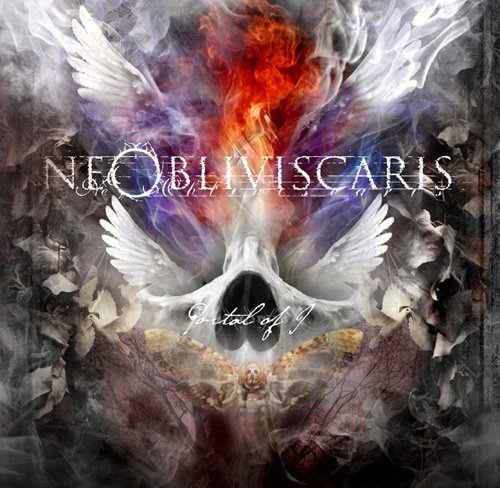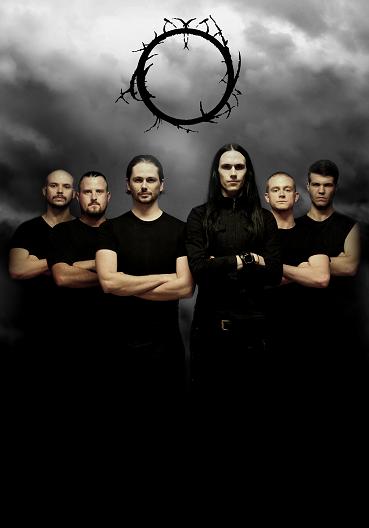Ne Obliviscaris – Portal of I (11 June 2012, Code666 Records)
How’s it going, Dear Readers? I’ve got another amazing album I would like to share with you. I’ve been so fortunate with how much good stuff I’ve been coming across lately, I only wish that I had more time to write about it all so that you could have the chance to read about it and listen to it sooner! I guess what I’m saying is, it makes me feel guilty that my brain and fingers don’t work quite as fast as my ears sometimes…
Anyway, here we have Portal of I, the (relatively) new album by the Melburnian sextet Ne Obliviscaris. I usually have a pretty good memory when it comes to my history with specific bands, but to be honest I have no idea where or when I discovered these guys. Chances are, I probably read something about them over at No Clean Singing, or possibly at The Number of the Blog, since I’ve made an awful lot of discoveries through both of those places.
Oh and by the way, for all you former TNOTB readers who have been grieving since that website was lost in cyberspace, I hope you’ve started reading Oculus Infernus, the new home of head editor and writer Grover XIII. In case you haven’t seen it yet, the new blog can be found here. (And while we’re at it, No Clean Singing is over here.)
As I was saying, sometime, somehow I came across this group of Aussies, and I found them intriguing enough to “like” them on Facebook. Fast-forward to this May, when the band invited all their fans to “International Ne Obliviscaris Sharing Day” — when they planned to reveal an advance single from their then-forthcoming new album. I wrote about that impromptu holiday, and then shared the song (“Xenoflux”). Based on previous experience I had expected it would be good, but as it turns out, it was amazing!
To make a long story short, soon after that, the album was released in Australia and New Zealand on Welkin Records, a small, independent label run by one of the band members; right around the same time it was announced that Ne Obliviscaris had signed on with Italy’s Code666 Records for the rest of the world. This made perfect sense to me, since I’ve always found that Code666 tends to work with very good — and very unique — bands. So then the album was available all over the world, and about a month later, it’s finally time for me to share this masterpiece with you.
Ne Obliviscaris (named for the Latin phrase meaning “Do Not Forget”) is an extreme metal band that has a violin in it. Ask anybody, even the band themselves, and that’s probably the first description you’ll get. In fact, on their Facebook page, the description reads, “Progressive/extreme/melodic metal (with violin) from Melbourne, Australia.”
If you ask me, that doesn’t really paint a good enough picture. Korpiklaani is a metal band with a violinist, but don’t expect to find any metal songs with folk music incorporated into it (nor folk songs with metal music incorporated) here. And, while they may not have a violinist as an actual band member, Septicflesh is another extreme metal band that has uses orchestral and symphonic instruments, but don’t expect metal songs with orchestral parts added to them (nor orchestral music with metal added), either.
No, what that description fails to tell you is that this is a six-piece band where one of those pieces just happens to be a violin; these songs weren’t all arranged and then the band decided to add a violin on top — it’s every bit a part of things as the guitars, bass, drums, or the vocals are. Just like Camper Van Beethoven, or Kansas, or Dave Matthews Band.
Okay, okay, nothing like Dave Matthews Band.
But now that I’ve mentioned it, Kansas is not such an odd comparison — if they used way more distortion and replaced one of the singers with a black/death metal guy. They might not get a lot of recognition when people are talking about the foundations of progressive rock, but many of their songs — even some of the better-known ones like “Point of Know Return” or “Carry on Wayward Son” — employ atypical structures and exhibit many of the common characteristics of what is referred to as progressive music.
Likewise, Ne Obliviscaris would very aptly be described as progressive — or even avant-garde, in one of the rare cases when that term can be applied in its literal sense, referring to something that is so unique and experimental as to be at the forefront (or ‘vanguard’) of its field.
One only has to look as far as the very first song on this album, “Tapestry of the Starless Abstract” (which is one of several songs available for streaming via the Bandcamp widget embedded below) for evidence of this. Even within just the first minute or two (out of the song’s twelve-minute duration) — it starts out sounding like purely atmospheric black metal, then almost immediately the sound breaks down with the vocals dropping out in favor of some tuneless noodly plucking on the violin strings, segueing straight into more of a death-metal feel (the drumming and riffing remain fairly similar at first, but a deep gutteral growl enters, accompanying the lofty clean vocals, in place of the blackened snarls from the beginning of the song). Light acoutic guitar strumming sets an interesting texture against the heavy riffs, which then are accompanied by some spacey dive-bomb guitar sounds. Like I said, this is only the first two minutes!
A lengthy middle section (still talking about the same song) of ringing banjo-rolls (again on the acoustic guitar) supports a far-off melody on the violin, until the metal guitars re-enter, while the violin moves back into the forefront. From here on, the rest of the track sums up the essence of the album as a whole: alternating between black and death metal, psychedelic and power metal, sometimes two or more of these at the same time, this is surely the exact definition of “progressive.”
This is music that seems to thrive on contrasts. Often punishingly heavy, with monstrous guitar riffs and blastbeat drumming, the acoustic guitar still shines through as a textural element, or sometimes it takes the driver’s seat (at one point, even almost resembling the distinctive picking style of the Kansas classic “Dust in the Wind,” though that could be just my imagination).
The violin, similarly adds interesting colors to the otherwise brutal metallic music, and sometimes steps out into the spotlight (more than once bringing to mind the iconic solo from Rimsky-Korsakov‘s “Capriccio Espagnol”) or at least shares it, intertwining melodic lines with the lead guitar part.
Just as often, though, things turn deathly still — with just a minimal amount of guitar, violin, or singing carrying the song for a brief interlude. And speaking of contrasts, the bass and drums also take turns leading the show, here with a few minutes of jazzy vamping, or there with a bit of funk-rock-inspired grooves. In the end, though, it always comes back to the metal — out of nowhere they’ll explode back into a whirling madness.
Vocally, the group tends to use contrast and juxtaposition as well — a blackened rasp through some parts, switching over to the death-growl-plus-clean duet in other parts. The growling is a fairly deep roar, yet set into the mix in such a way as to highlight (rather than obscure) the clean parts, much in the same way the crunchy guitar chords accentuate (rather than overpower) the violin.
“Clean singing” is another phrase that can often give the wrong impression, especially when used in conjunction with the harsher extreme metal vocal styles that are present here. Too often the clean part consists of what I unaffectionately refer to as “whiny emo bitch” singing. Not so with NeO. Instead, here they either sound powerful (not in the sense of power metal, but a good, strong, masculine voice) or falsetto and delicate — still managing to convey powerful emotion, but sounding quite lovely (somewhat along the lines of Bono on songs like “With or Without You” or “One”).
In the end, though, try as I might, I find I’m unable to adequately describe the powerful feelings one experiences while listening to Portal of I. As the name implies, the recording is like a 70-minute journey deep within oneself. I’ve done my best to tell you what the music sounds like, on the surface, but you really need to check it out for yourself to truly “get it.” Fortunately, almost all of it is available for you to sample before making your purchase…
Listen to four out of the seven songs from the album (tracks 1-3-5-7) via this Bandcamp widget, where you can also purchase a digital download (which would include the entire album)…
Here is the song that had been offered as an advance preview of the album, “Xenoflux” (track 2)…
Australia/New Zealand readers, order the CD (or t-shirts, hoodies, posters) from Welkin Records here.
Everyone else (USA/Europe/etc), you can get the CD (or t-shirt) from the Aural Music webstore here.
———————————–
Ne Obliviscaris: website, Facebook
Code666: website, Facebook, Bandcamp, webstore
Welkin Records: Facebook, webstore


